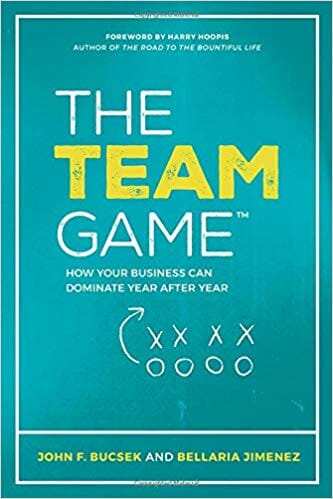Note: The following is an excerpt from the recently published book, The Team Game: How Your Business Can Dominate Year after Year
∼∼∼∼∼
During industry meetings over the last few years, we have consistently heard the same concerns and frustrations from employers regarding recruiting and retaining millennials:“They lack soft skills.” “I can’t retain good people.” “The new generation isn’t committed.” “They leave after a few years.” “Our style of leadership is not having an impact.”
It is somewhat remarkable to think that nearly 20 years after millennials first entered the workforce, we are still trying to figure them out. But then, this is a unique group, unlike any other previous generation. As teenagers they were labeled lazy, entitled, and self-obsessed; as employees, they have been criticized for being too demanding and more apt to talk than listen.
However, millennials are also an incredibly talented and tech savvy group that will drive the business world over the next two decades. Next year, 50% of the global workforce will be comprised of millennials, according to PwC. They already make up the largest percentage of the U.S. workforce.
So the concerns and frustrations raised by employers about how to attract millennials and keep them engaged — as well as the best practices for doing so — will be on-going. Human resources professionals will play an integral part in helping companies to onboard millennials and develop a corporate culture in which they will want to stay.
We believe the culture best suited for understanding millennials and playing to their strengths is a teaming culture.
A business team game
What is teaming? The quick answer is that it is the most effective process for navigating through change. And that’s important to know because the greatest challenge organizations face today is constant change. New technology or new consumer preferences can disrupt a business’s core competencies, forcing organizations to rethink their business strategies and, at times, rebuild their cultures from scratch. And change, in our lifetimes, will only continue to accelerate.
Organizations today need to remain flexible to navigate through the changes. And that is where the teaming concept comes in.
Teaming has been used by the military to execute more successfully in an increasingly changing world. It has been embraced on college campuses to encourage students to work together to boost their learning experiences. And it has been implemented in businesses to maximize ideas, potential, and creativity within organizations.
What teaming provides is a platform for mentoring and collaboration, focusing on individuals’ unique abilities and keeping work more engaging through building trust, relationships, and a support system. And that all speaks to millennials.
Millennials collaborate
Millennials have always been drawn to teams. In the digital world in which they grew up, specifically gaming, they became accustomed to collaborating with others to reach new levels of achievement. That spirit of teamwork has carried over into their professional lives, where they now want the ability to freely share ideas with co-workers, to work together to achieve a common goal. And that is why businesses with teaming cultures are so attractive to millennials.
Teaming promotes a culture of collaboration that aligns with — and speaks to — the millennial view of gaming and work:
Roles and responsibilities — When it comes to their careers, millennials want to be in control. That is, they desire ownership of their positions and the tasks associated with them. Identifying clear roles and responsibilities helps them have that ownership they crave. In addition, it provides them with the knowledge of who is on their team and the roles those teammates have for achieving overall group success, which ultimately builds trust within the organization. When expectations are clearly communicated, millennials feel in control of their career paths.
Performance tracking — While previous generations might have balked at performance tracking, millennials embrace it. In fact, in the games they played growing up they were used to having instant access to data that showed their progress — how they were doing and what they needed to do to attain new levels. Organizations using performance tracking today are not only able to improve employee efficiency and company processes, but they are also actually helping millennials stay on top of their career paths.
Team playbook — The online games millennials play come with tutorials that explain how each game works, what each player does, and what gamers can do to improve their skills. In a teaming culture you’ll find the same. The team playbook contains the rules of play for an organization, all the fundamentals from the company vision and mission to compensation structure. Keep in mind that for most millennials, the definition of success is meaningful work. In life and in games, they want to change the world. If they know “the why” of their work or your organization — your culture, your values, and your charitable efforts — they are more likely to stay. A playbook will clearly define all of this for them.
Diversity — Teaming helps companies ensure they have the right people for the right jobs, seeking out varying skill sets and embracing diversity to ensure they put themselves in the best possible position to achieve greater results. Millennials have played with a diverse group as gamers and they are highly desirable of workplaces where diversity is welcomed.
Mentoring — Teaming is appealing to millennial women because such a culture offers the opportunity to work in a collaborative environment to gain support and training through partnering and mentoring. In teaming, assistant coaches are specialists in one area. They have defined areas of the business in which they put their expertise to work. They are key because they assist with mentoring team members, oversee skills training, and help with talent management.
Recruiting for teaming
In recruiting for a teaming culture, your focus should be on achieving a collaborative culture. That means forming the team not necessarily with the best players available, but with the right players. Not with like players, but with players that complement each other’s unique abilities and add different skill sets to the team.
In our organization, we do not recruit for the company as a whole, we recruit advisors to work on specific teams. This simplifies the process since we interview the teams to understand what they are looking for in the candidate. Some teams work together with different levels of clients. For example, in a team focused on wealth accumulation, the team leader will focus on high net worth clients while the others work with lower-tier clients who are still building their assets. However, as a team, they have set goals as outlined in their playbook, and they know exactly what role they need to fulfill for the team.
Teaming culture is structured
Our teaming culture is very structured. We expect our teams to follow our playbook, which details all our organization’s processes as well as specific goals for the team. Weekly and monthly reviews help to see where they are compared to their goals. As a team, they decide how to continue to grow, and together, we determine their recruiting needs.
We put a lot of importance on psychological safety in the recruiting process for the simple reason that having the ability to take risks and know that team members are supportive is critical to success. Therefore, we involve existing team members in the interview process because they know best what unique abilities they are looking for in an individual. In this way, our HR staff can match abilities and personalities with team needs, and the team can build trust right with a candidate from the start. It is an intentional, well-thought-out process for forming teams that ultimately creates a high-trust culture.
That is not to say that there are not occasional kinks in the process. One thing HR cannot always judge from interviews is a person’s work ethic. This is one area where we have seen conflicts on teams arise. When building a team or bringing a new individual onto a team, it is important for each team member not only to recognize each other’s talent, but to also make sure that their work ethic match. Expectations should be set, and when a team member falls short of those expectations, immediate action should take place as the entire team will be affected.
How to discover teaming fit
Recruiting to a team culture requires incorporating a few questions to the process to better understand a candidate’s mind-set and ability to collaborate. It is easy to agree to teaming but providing clear examples of how the candidate has been in teams or successfully used teaming is a stronger indication of his or her success.
We have incorporated questions into our interview process to guide us toward finding candidates who fit our culture of teamwork. We ask candidates, for example, if they have been part of a team in the past, and to provide examples on how they have collaborated. That gives us an indication of how open they are to teaming. Some examples of questions include:
- Why are you pursuing this position? (Look for well-thought-out responses, with passion and meaning.)
- What is something unique about the work you do? (Look for traits and skills you need that tie to your vision and team roles.)
- Do you feel you work better individually or in a team setting? (Answers such as “I like to work alone” or “I get more done when I am working by myself” are obviously not ideal for teaming.)
- Can you provide some examples of how you have engaged in teams? (Look for examples that demonstrate collaboration, communication, and idea sharing.)
Teaming’s benefits
Teaming is attractive to millennials for the culture of collaboration it offers. Recruiting and, more importantly, retaining millennials is not only critical to helping a business grow, but also to simply staying in business during changing times.
Switching to a teaming culture requires commitment, and as with any change, it can be scary to undertake a new business strategy. But the benefits to an organization go far beyond creating an environment that appeals to millennials. Teaming’s appeal, as we see it:
- Maximizing time — The No. 1 challenge for most companies is how to expand without adding more hours to everyone’s workday. Teaming helps leaders identify individuals with unique abilities to improve efficiencies in business processes.
- Multiplying success — With teaming, Talent equals Energy times the combination of Attitude plus team M It’s an equation that looks like this: T = E x (A + M). You can increase business by increasing E, A, or M. That is, by singularly increasing members or attitude, or both together, and multiplying that by the energy of your team members, productivity increases.
- Aligning goals — By ensuring you have the right people for the right jobs and by seeking out unique skill sets and embracing diversity, you can create an environment where all goals are in alignment and each team member plays a significant part in the business game.
- Increasing retention — With teaming, workplace satisfaction not only increases productivity, but it also helps organizations retain the key players they need to achieve greater levels of success.
- Succession planning — Retention is key in helping companies with their succession planning efforts. Effective succession planning is more than just replacing people; it is about developing people. With teaming, the clearly defined roles and responsibilities pave the way for the right players to fill the voids.
We have used teaming in our organization for nearly 20 years, about the time millennials started to join the workforce. Back then, we had no idea of the correlation between the work habits of millennials and teaming. But time has shown that the teaming concept is an ideal environment for this generation. It appeals to their gaming nature in terms collaboration and advancement. Most importantly, it affords businesses that have experienced frustration in retaining millennials a greater possibility for keeping these talented individuals.
